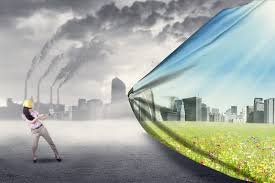Environmental Engineering
Hi friends of Steemit, as I had said before, I'm an environmental engineer and that's the reason why I want to tell you a little about my profession

Fuente: GitHub
According to Jim Lucas the environmental engineering is the branch of engineering that is concerned with protecting people from the effects of adverse environmental effects, such as pollution, as well as improving environmental quality. Environmental engineers work to improve recycling, waste disposal, public health, and water and air pollution control, according to the U.S. Bureau of Labor Statistics.
The practice of environmental engineering dates back to the dawn of civilization. Ever since groups of people began living in semi-permanent settlements, they have had to deal with the challenges of providing clean water and disposing of solid waste and sewage. With the growth of cities and the advent of large-scale farming and manufacturing, people have also had to worry about air quality and soil contamination.

Fuente: GitHub
What do environmental engineers do?
Environmental engineers use the principles of engineering, soil science, biology and chemistry to develop solutions to environmental problems.
One of the most important responsibilities of environmental engineering is to prevent the release of harmful chemical and biological contaminants into the air, water and soil, the BLS says. This requires extensive knowledge of the chemistry and biology of the potential contaminants as well as the industrial or agricultural processes that might lead to their release. With this knowledge, new processes can be designed, or existing processes can be modified, to reduce or eliminate the release of pollutants.
Another important function performed by environmental engineers is detecting the presence of pollutants and tracking them back to their source, the BLS says. In some cases, this can present a significant challenge. For instance, the source of contamination in a lake could be anywhere within several thousands of acres of land surrounding the lake and its tributaries. Contamination of oceans can present even greater challenges in identifying the source.
Once the environmental engineer identifies a source of contamination, it must be stopped or significantly reduced. Simply shutting down a business is not always a viable option, because of the potential for severe economic consequences. Environmental engineers often work with businesses to determine ways to avoid or reduce the production of pollutants or to separate them so they can be disposed of in a safe manner.
Critical skills needed by environmental engineers include a working knowledge of chemical engineering, fluid dynamics, geography, geology and hydrology. Also, because of the numerous legal issues involved and the prevalence of litigation in environmental issues, environmental engineers must be familiar with applicable laws, and many of them are also practicing attorneys.
Fuente del artículo: GitHub
As you can see, my profession has great skills to contribute to sustainable development, so every day I feel a greater commitment and responsibility to work promoting activities that lead to lower environmental impacts to protect, in general, life on the planet.

Fuente: GitHub
Plagiarism isn't acceptable here. So unless you are Jim Lucas then you shouldn't have posted this.
for that reason I wrote the source of the original article...
Hi
Welcome to Steem. It's an awesome community. I followed you. Please follow back. Good Luck.
Hi! I am a robot. I just upvoted you! I found similar content that readers might be interested in:
https://www.livescience.com/48390-environmental-engineering.html
That's a serious stuff! Welcome :)
Thanks!